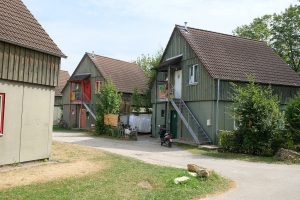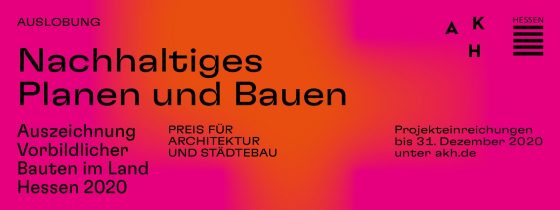 A big thank you to Mr Pohlmeyer for the current photos of the small "Cube settlement".
A big thank you to Mr Pohlmeyer for the current photos of the small "Cube settlement".
To the Photo gallery 9/2016
Keywords: Wood construction, News Blog Baden-Württemberg, Settlements, Residential, sdg21 news
 A big thank you to Mr Pohlmeyer for the current photos of the small "Cube settlement".
A big thank you to Mr Pohlmeyer for the current photos of the small "Cube settlement".
To the Photo gallery 9/2016
Dresden, 22.10.2019
Heliatek, the world's leading provider of organic solar energy solutions, announces that its award-winning technology has been certified by TÜV Rheinland as having a carbon footprint of less than 16 kg CO2e/m2 in a Life Cycle Assessment (LCA). For a sustainable future in the face of ever increasing climate change, the planet's growing energy needs must be met by environmentally friendly low carbon energy sources. Heliatek has developed industrial grade organic solar films that are suitable for almost any building surface and help to significantly avoid greenhouse gas emissions.
After less than 3 months, the organic solar films studied already save the CO2e (CO2 equivalent) produced during the entire life cycle, from production to disposal. "We can proudly announce that we offer one of the most environmentally friendly ways to generate electricity and significantly avoid greenhouse gas emissions. The unique composition of our organic solar films without toxic materials and with PET based protective films makes even the disposal of the modules at the end of their life easy and at the same time environmentally conscious," says Guido van Tartwijk, CEO of Heliatek.
In order to compare the carbon footprint with other solar technologies, all results must be converted into g CO2e/kWh. This value takes into account the lifetime electricity generation for a given location. For Southern Europe, HeliaSol® has a carbon footprint of only 5-7 g CO2e/kWh (7-9 g CO2e/kWh in Central Europe) and thus already significantly undercuts all current solar technologies.
Standard modules based on crystalline silicon achieve values of 40 - 100 g CO2e/kWh depending on the installation site and the origin of the modules. "With the planned improvement in our efficiency, we will further reduce the carbon footprint of our product to become the energy source with the lowest CO2 footprint - including hydropower, wind and solar energy. This is a truly green product," says Jan Birnstock, CTO of Heliatek.
Heliatek is currently installing the new production line for the series production of its unique OPV solar films. The production line is in the start-up phase and will produce organic solar films with an annual capacity of up to 1 million m² from mid-2020.
About the TÜV Rheinland life cycle assessment
TÜV Rheinland has certified Heliatek's HeliaSol® , as one of the first companies in the solar industry, in a life cycle assessment according to ISO 14040/44. This analysis provides a structured and comprehensive method for quantifying energy and material flows and their potential environmental impact. The LCA analyzes the environmental impact of all phases of a product's life, from raw material procurement, through production and use, to disposal at the end of the product's life, including all transport and delivery routes ("cradle-to-grave"). All site-related conversions of the TÜV values were carried out by Heliatek.
The TÜV Rheinland certificate is available online at the ID number below and can be accessed by scanning the following QR code:

About Heliatek
As the technology leader in organic photovoltaics, Heliatek develops, produces and distributes industrial organic PV solar solutions for almost any building surface (horizontal, vertical, curved, rigid and flexible). Heliatek is synonymous with energy solutions designed for various traditional applications that were previously impossible due to their unique properties - they are ultra-light, flexible and truly green. HeliaSol® is a ready-made solution, ideal for retrofitting existing buildings. HeliaFilm® is a tailor-made solar film for companies in the construction and building materials industries, which can be integrated into their façade or roofing system products. Heliatek currently employs around 150 people at its sites in Dresden and Ulm in Germany.
Research and development work as well as the installation of production technology were supported by the Free State of Saxony, the Federal Republic of Germany and the European Union.
Keywords:
DE-News, Renewable, News Blog Saxony, PV, Life cycle assessment, Ecology
With the Sustainable Small House Building (BNK) quality seal, there is now a standard for detached and semi-detached houses that you can use, for example, to optimise the conditions for insurance and financing of your own home. At the first official award ceremony, our "Room for Healthy Ideas" was also awarded the top grade of 1.4.
The certificate was issued by Building Institute for Resource Efficient and Sustainable Building GmbH, Bamberg
Find out more at the Building scribbleNews
Keywords:
Awards, Building Biology, DE-News, Wood construction, News Blog Bavaria, Certification & Labels, Ecology
Deadline extension! Instead of 31.12.2020 the project submission ends up to and including Friday, 22.01.2021.

Prize for architecture and urban development
The State of Hesse, represented by the Hessian Ministry of Finance and the Chamber of Architects and Town Planners of Hesse jointly offer the award under a specific theme every three years. The theme for 2020 is "Sustainability“.
The competition is looking for innovative projects and plans in the field of sustainable planning and building that have been implemented in Hessen in the last five years or are currently being implemented.
The award procedure consists of two stages and is aimed at planners from Germany and abroad in the following fields Architecture, interior design, landscape architecture and urban planning as well as to private and public building owners.
Projects can be submitted up to and including 22. January 2020 at
www.akh.de/vorbildliche-bauten be submitted.
In phase 1, an international jury of experts will nominate a short list and in phase 2, after an on-site visit, select the award winners in four award categories. The award ceremony is planned for May 2021.
Keywords:
News Blog Hesse, Contests & Prizes
Climate protection is important to over 80 percent of Germans - but this should not be reflected in higher rental costs. In order to increase the acceptance of energy-efficient renovations, Deutsche Wohnen has developed a model of how climate protection and social compatibility can come together. The "Concept for Socially Compatible Climate Protection in the Building Sector" aims to significantly increase the rate of refurbishment in existing buildings in order to achieve national climate protection targets. At the same time, an economic stimulus package worth billions is being initiated.
For 89 percent of all Germans, environmental and climate protection is important or even very important. But it must not translate into excessive costs for rent. A maximum of fifty euros is what 87 percent are willing to pay additionally each month. This is the result of a survey conducted by the opinion research institute Kantar TNS on behalf of Deutsche Wohnen. And this is precisely where the concept of the future Berlin DAX company, published today, comes in. "Germany can only achieve its climate targets if the approx. 40 million flats are upgraded in terms of energy efficiency. However, the refurbishments actually implemented have so far fallen far short of the possibilities. We urgently need a renovation offensive," explains Michael Zahn, CEO of Deutsche Wohnen SE. However, energy-efficient refurbishments often fail due to the concerns of tenants who fear higher financial burdens. The result: refurbishments falter and remain at a low level.
"Climate protection and tenant protection must not be played off against each other," says Michael Zahn. This is precisely where the concept developed by Deutsche Wohnen comes in. It provides for tenants to be supported in the costs of energy-efficient renovations by the Energy and Climate Fund (EKF), which the federal government has set up as a special fund since 2011 via the CO2-taxation should be relieved. In this way, the state, landlords and tenants would work together to protect the climate.
This is therefore a solution for society as a whole, which the majority of Germans would also support in principle. When asked in the representative Kantar population survey who should bear the costs of energy-efficient renovations, 70 percent of the respondents named "tenants, landlords and the state together".
Deutsche Wohnen's concept now takes up this perspective and ties in with the German government's plan to make Germany largely climate-neutral by 2050. The building stock plays a key role in this, as it accounts for around one third of the national CO2-emissions. Against this background, an increase in the renovation rate from currently only one percent to at least 2.5 percent per year is urgently needed. This corresponds to about 600,000 additional housing units that would have to be renovated every year. In this way, 100 million tonnes of CO2 additional savings.
With this concept, Deutsche Wohnen wants to initiate a broad political and social discourse. It is united with the entrepreneurial alliance Stiftung 2°, of which Deutsche Wohnen is a sponsoring company, in the guiding principle of climate-friendly and socially acceptable economic activity. "The challenge of climate protection needs answers from society as a whole - companies, politicians and also citizens are called upon. I am therefore pleased that Deutsche Wohnen is presenting its concept as an important contribution to the debate on the role of the building sector in climate policy. I look forward to the discussions on this. Because one thing is clear: we must increase the renovation rate enormously in order to achieve our climate goals. And we have to do this in a socially responsible way to bring people along with us. Deutsche Wohnen's concept shows ways to do this and illustrates how climate protection can work as an economic stimulus programme," says Sabine Nallinger, Director of Stiftung 2° - German Entrepreneurs for Climate Protection.
According to Deutsche Wohnen's calculations, craft businesses and other trades involved in construction would benefit from additional orders amounting to 22 billion euros per year.
The necessary funds are already available. No additional budgetary funds need to be provided by the state. This is because the EKF is essentially fed by the proceeds from certificate trading within the framework of the CO2-pricing. The introduction of national emissions trading for the heating market from 2021 offers the opportunity to upgrade the EKF to the central funding instrument in the building sector. From then on, heat suppliers must emit CO2-certificates and will pass on the resulting costs to the end consumers. So those who heat more as consumers have to pay more for the climate. Through the proposed funding concept, these funds flow back into the building sector and are used for measures that benefit climate protection and the energy transition.
Deutsche Wohnen's concept - of promoting energy-efficient modernisation in buildings through the EKF - means that tenants actually benefit from a lower overall rent in the first few years. For example, a Berlin family living in a 90-square-metre old flat would save around 4,300 euros over the funding period. In addition, the energy costs of the flat are almost halved. Thus, the most important obstacle, namely the cost burden for the residents, could be solved pragmatically.
The result would be a milestone on the way to a climate-neutral building stock, from which everyone would benefit: Tenants and owner-occupiers would be relieved, landlords would experience greater acceptance of modernisation projects and Germany would be able to make its promised contribution to climate protection.
Further information on the concept:
www.deutsche-wohnen.com/klimakonzept
Source: DW PM of 15.06.2020
Keywords:
Stock, DE-News, Funding, Climate protection, News Blog Berlin, Quarters, Settlements, Environmental policy, Housing, Housing policy